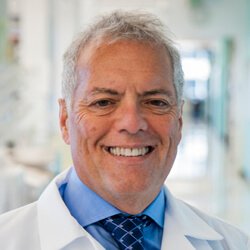Portman Research Group
Welcome to the Portman Research Group
Led by Dr. Michael Portman, the Portman Research Group is developing innovative ways to protect children's hearts from damage related to heart surgery and is improving how the medical community understands and treats Kawasaki disease.
The lab's myocardial protection program is unraveling the metabolic processes that govern how the heart responds to - and recovers from - surgery. The Portman team's research builds on its discovery that when infants supported by cardiopulmonary bypass are given triiodothryonine - a thyroid hormone - it shortens the time they need to spend on ventilators. The lab is working to understand why this hormone is effective and is identifying other nutritional supplements that could shorten recovery times and improve long-term survival for children who undergo heart surgery.
The Portman Research Group also leads a major Kawasaki disease research program that aims to eradicate heart damage caused by the condition. Portman and his colleagues are pursuing a new theory that could help illuminate the causes of Kawasaki disease (KD) and are making discoveries that could improve KD treatment.
To support Portman's work and help accelerate his research developing new diagnostic tests and more effective therapies for KD, donate now. To direct your donation to Dr. Portman's research, please indicate your choice in the optional section of the form by selecting “Other.”
Kawasaki Disease Research
Dr. Michael Portman explains how his team is uncovering what causes Kawasaki disease and pursuing better treatments for children.
Investigator Biography

Michael A Portman, MD
Michael A. Portman, MD, is director of research in the Division of Cardiology at Seattle Children's Hospital and a professor in the Department of Pediatrics at the University of Washington School of Medicine. He is an attending physician and cardiologist at Seattle Children's Heart Center. Portman's research activities include conducting pharmacological clinical trials; leading basic science projects focused on cardiac metabolism and genetics; and mentoring future clinical researchers. Portman is also the principal investigator of the Stipends for Training Aspiring Researchers (STAR) program, whose goal is to increase the number of students entering cardiology, pulmonary, hematology and sleep research. He is an editorial board member of the American Journal of Physiology — Heart and Circulatory Physiology.
Latest News
Kawasaki Disease Whole-Genome Sequencing Study May Bring More Precise Treatments
Dr. Michael Portman, principal investigator in the Norcliffe Foundation Center for Integrative Brain Research and director of research in Seattle Children’s Division of Cardiology, and colleagues published the largest whole-genome sequencing study of patients with Kawasaki disease, the leading cause of acquired heart disease among children in developed countries. The study, featured in the journal Frontiers in Immunology, found a range of genetic variations associated with non-responsiveness to the standard Kawasaki disease treatment, intravenous gamma globulin — and patient ancestry impacted these variations. Their findings could lead to precision treatment for the disease. Learn more.
Selected Publications
Dr. Michael Portman has authored dozens of research papers, including the selected publications listed below. To see more of Portman's publications, view a complete list on PubMed.
- Portman MA. Kawasaki disease and soy: potential role for isoflavone interaction with FcGamma receptors. Pediatr Res. 2012 Nov 20. [Epub ahead of print]
- Priest JR, Slee A, Olson AK, Ledee D, Morrish F, Portman MA. Triiodothyronine supplementation and cytokines during cardiopulmonary bypass in infants and children. J Thorac Cardiovasc Surg. 2012 Oct;144 (4):938-943.e2.
- Shrestha S, Wiener H, Shendre A, Kaslow RA, Wu J, Olson A, Bowles NE, Patel H, Edberg JC, Portman MA. Role of activating FcγR gene polymorphisms in Kawasaki disease susceptibility and intravenous immunoglobulin response.Circ Cardiovasc Genet. 2012 Jun;5 (3):309-16.
- Olson AK, Bouchard B, Ning XH, Isern N, Rosiers CD, Portman MA. Triiodothyronine increases myocardial function and pyruvate entry into the citric acid cycle after reperfusion in a model of infant cardiopulmonary bypass. Am J Physiol Heart Circ Physiol. 2012 Mar 1;302 (5):H1086-93.
- Portman MA, Olson A, Soriano B, Dahdah N, Williams R, Kirkpatrick E. Etanercept as adjunctive treatment for acute Kawasaki disease: study design and rationale. Am Heart J. 2011 Mar;161 (3):494-9.
- Portman MA, Slee A, Olson AK, Cohen G, Karl T, Tong E, Hastings L, Patel H, Reinhartz O, Mott AR, Mainwaring R, Linam J, Danzi S; TRICC Investigators. Triiodothyronine Supplementation in Infants and Children Undergoing Cardiopulmonary Bypass (TRICC): a multicenter placebo-controlled randomized trial: age analysis. Circulation. 2010 Sep 14;122 (11 Suppl):S224-33.
Participate in Research
You can help us answer questions about childhood health and illness and help other children in the future. Learn more about clinical trials and research studies at Seattle Children’s.
